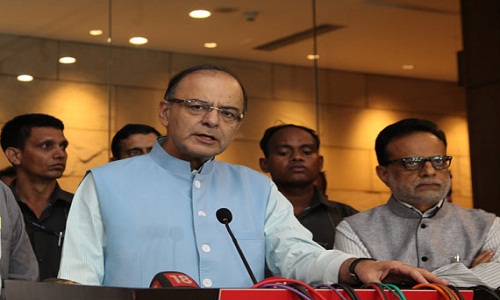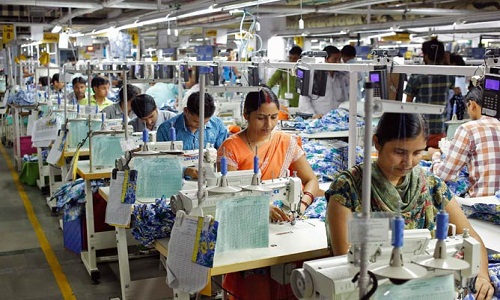"The government has announced a slew of measures for the textile sector, through labour reforms to generate 10 million jobs, boost exports by a cumulative $30 billion and investments by Rs 74,000 crores over three years. Estimated to cost Rs 6,000 crores, the special package approved by the Cabinet is to improve competitiveness, lead to greater production through a string of labour reforms and generate jobs. An estimated 70 per cent of workforce in garments industry are women."

The government has announced a slew of measures for the textile sector, through labour reforms to generate 10 million jobs, boost exports by a cumulative $30 billion and investments by Rs 74,000 crores over three years. Estimated to cost Rs 6,000 crores, the special package approved by the Cabinet is to improve competitiveness, lead to greater production through a string of labour reforms and generate jobs. An estimated 70 per cent of workforce in garments industry are women.
Industry cheers package

Clothing Manufacturers Association of India (CMAI) has welcomed the package. As Rahul Mehta, President of CMAI says the announcements have unshackled the garment industry and the results will be evident not only by way of additional employment generation but also additional exports. Mehta said the inclusion of State level taxes in the computation of duty drawback will address a long standing demand of the industry, and will provide a major relief to the exporting segment. “The EPF reforms - government bearing the whole PF burden of the industry and making PF optional for employees earning less than Rs 15000 per month - will help the industry as well as the workers,” he added.
R K Dalmia, Chairman of The Cotton Textiles Export Promotion Council (TEXPROCIL) though has welcomed the special package, but has expressed deep concern for ignoring Home Textile sector in the special package, which is equally labour intensive industry at par with Apparel sector. In particular, manufacturing of bed-linen requires more number of workers in making each piece of the product. He emphasized that the process is the same i.e. adding value after cutting the fabric and using trims etc. in the manufacture of finished products. Considering these facts, Dalmia appealed to the government to consider treating all the ‘cut and sew’ products (including Home Textiles and Made-ups) for granting benefits under the special package for employment generation and promotion of export, at par with Apparel products.
Industry as a whole has cheered the decision to extend incentives under the amended Technology Upgradation Fund scheme from 15 per cent to 25 per cent. Shishir Jaipuria, Chairman, FICCI Textiles Committee, said the Indian textiles and garment industry is facing tough competition in the global market, the refund of state levies comes as a breather and would help them to gain more competitiveness in global markets, where we have to compete with duty-free regimes.
Significant among these reforms was the government's decision to fund the full 12 per cent of the employers' contribution to the Employees' Provident Fund Scheme for new employees in the garment industry if the candidate earned less than Rs 15,000 a month. The scheme, which will run for three years, would cost the textiles ministry Rs 1,170 crore.
The Ministry has also taken on textile factory owners by instituting fixed-term employment for garment sector employees. Employees had long demanded they be considered as permanent and their working hours and wages be fixed, as the industry was seasonal. The ministry has also fixed overtime hours for workers, to not exceed eight hours a week, in line with International Labour Organisation norms.

M Senthilkumar, Chairman, The Southern India Mills’ Association (SIMA) has welcomed the package and stated that slew of measures would greatly help exports which attract 16 to 20 per cent duty in all the major international markets. He welcomed the relaxation of labour laws which is a long pending demand of the industry. The bearing 12 per cent of the employer’s contribution of Employee Provident Fund Scheme by the government for the new employees of the garment sector for the first three years would benefit the sector and the employees under the current scenario. Senthilkumar has hailed the announcement of optional EPF for employees earning less than Rs 15,000 would heave a sigh of relief for the garmenting sector where large number of employees work for short term and prefer to take full wages without deduction.
The Confederation of Indian Textile Industry (CITI) has welcomed the initiative for job creation. In a statement CITI has said it hopes this is the first step towards creating employment and more initiatives are expected to follow to strengthen and support the textile value chain and the make in India initiative. "China and India have robust textile value chain, which has been the core strength and source of confidence for international buying houses. It is also a fact that Bangladesh is heavily investing to strengthen the textile value chain to provide comfort to the buying houses and maintain their growth for garment exports. On the back of TPP discussions, Vietnam is investing in substantial capacities for yarn and fabric manufacturing to bolster their value chain to support and enhance their garment exports," CITI said in its statement. However, CITI has said that the package should integrate the apparel export benefit to further strengthen the textile value chain. "












